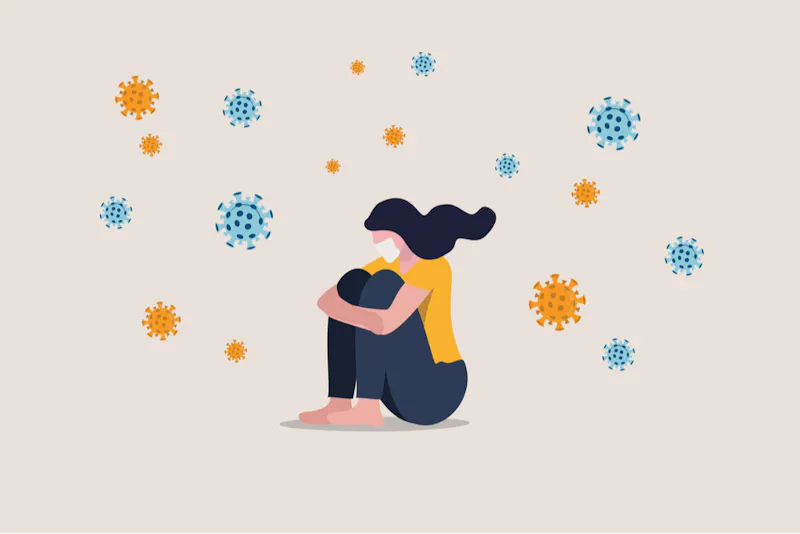What is health anxiety and how to overcome it



It’s normal to be concerned about your health, and you should be doing what you can to stay healthy. But health anxiety is an irrational fear of being seriously ill. This type of anxiety can be so debilitating that it makes you feel ill and creates a cycle that is hard to break.
What is health anxiety?
Health anxiety (hypochondria) is worrying irrationally and excessively about your health. Unlike an ordinary sense of worry, this can start interfering with your daily life.
You might have no physical symptoms but still believe you have a severe illness, even if medical assessment proves otherwise.
This extreme anxiety can cause physical symptoms, like headaches, stomach issues, nausea, and fatigue, which you might mistake for an illness.
Health anxiety can be debilitating and affect your quality of life.
What causes health anxiety?
The causes of health anxiety aren't entirely clear, but you might be more likely to develop health anxiety if you:
- experienced any form of childhood trauma or severe childhood illness
- are experiencing severe stress
- have experienced severe illness in your family, or your family worry excessively about their health
- have mental health disorders — like anxiety, depression, or obsessive-compulsive disorder (OCD)
Symptoms of health anxiety
People with health anxiety fixate on anything that might convince them they're ill.
You might have health anxiety if you:
- always worry that you might be ill
- always fixate on minor symptoms that could be a sign of illness —like a lump, tingling, or pain, to the point where it creates anxiety
- often ask people's reassurance about your symptoms
- have a fear of seeing medical conditions on TV or in movies
- always look up your symptoms on the internet, looking for an illness as a cause
- regularly read health information and news online
- believe you’re ill and withdraw from physical activities or social situations
- fixate on normal bodily functions like your heart rate and sweating, and convince yourself they're abnormal
- overshare your symptoms and possible illnesses with others
- avoid people, places and certain foods out of fear of developing an illness
- exaggerate your symptoms and their severity
Treatment for health anxiety
You should see a GP if your health anxiety lasts over a couple of weeks and self-help isn't working.
Your GP will diagnose you with health anxiety based on the signs and duration. They might refer you to a mental health professional, or offer medication to help you manage health anxiety.
Psychotherapy like cognitive behavioural therapy (CBT)
When self-help doesn't work, a GP might be able to refer you for cognitive behavioural therapy to help you manage health anxiety. CBT can help you to:
- understand what triggers your health beliefs and anxiety
- regulate your feelings
- develop strategies to cope in everyday life without avoiding situations like social events
Medication
You can also manage severe anxiety and depression, which might trigger health anxiety, with medication prescribed by your GP depending on the severity of your condition. These might include:
- selective serotonin reuptake inhibitors (SSRIs)
- serotonin and noradrenaline reuptake inhibitors (SNRIs)
- pregabalin
- benzodiazepines
Self-help
If you can't get help through a GP or referral, there are things you can do to break the health anxiety cycle.
Track your health anxiety
Keep a journal of your health anxiety and look for potential triggers.
Break your health anxiety cycle
Distract yourself by going for a walk, taking up a hobby, or talking to a friend.
Manage stress
Manage your daily stress with breathing exercises and meditation.
Get enough sleep
Practice good sleep hygiene and limit screen time before bed. Aim for between 7-9 hours of sleep a night.
Get moving
Do regular exercise to help you manage stress.
Limit health information
Try to avoid looking at your symptoms online or reading health news. Get your health information from credible sources like our Health Hub.
Take control
Control what you can and advocate for your health. You can understand your baseline by doing regular home blood tests.
National Health Services (2020). Health Anxiety. Retrieved. 9 June 2020. URL: https://www.nhs.uk/mental-health/conditions/health-anxiety/
Tyrer P, Eilenberg T, Fink P, Hedman E, Tyrer H. Health anxiety: the silent, disabling epidemic BMJ 2016; 353 :i2250 doi:10.1136/bmj.i2250